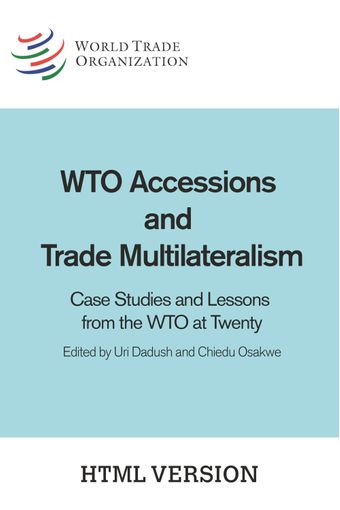Intellectual property rights protection: The plus/minus debate from a least-developed country perspective – sense and nonsense

- Authors: Alexandra Bhattacharya and Joan Laker Apecu
- Source: WTO Accessions and Trade Multilateralism , pp 39-39
- Publication Date: January 2015
- DOI: https://doi.org/10.30875/f62cb98b-en
- Language: English
This chapter asks whether distinctions exist between the original WTO least-developed country (LDC) members and the Article XII LDCs in respect of their obligations under the WTO Trade-Related Aspects of Intellectual Property Rights (TRIPs) Agreement. The chapter examines the evidence from the protocols of accession of the seven Article XII LDCs in the context of the associated treaty dialogue in their working party reports. It finds that distinctions exist and that the commitments accepted by Article XII LDCs, in some respects, go beyond the original requirements of the TRIPs Agreements and therefore also go beyond the TRIPs obligations of original LDC members. The chapter investigates these WTO TRIPs ‘plus’ commitments and assesses their merits in relation to the sovereign determined domestic reform priorities of the Article XII members and possible implications for the rules-based multilateral trading system. It is argued that the TRIPs Agreement is a minimum standards agreement, consisting of both principles and substantive obligations, with built-in flexibilities and considerable scope for interpretation and national implementation of its provisions. WTO members may deviate from these minimum standards to the extent that they benefit from longer or shorter periods of transitional relief, which may vary according to an LDC member’s status as either an original member or Article XII member. Accession-specific commitments and associated treaty dialogue also show that there is implementation ‘flexibility’ on the basis of pre-determined action plans. The chapter finds that, in those instances where Article XII LDCs members have undertaken legally binding commitments to implement WTO-plus obligations, the substantive minimum standards of protection of the TRIPs Agreement have been increased. These WTO-plus binding commitments have been used to ‘lock in’ domestic institutional and structural reforms, based on domestic development priorities to encourage innovation and attraction of foreign direct investment, and they have served a domestic reform purpose to encourage innovation, induce foreign direct investment and strengthen the TRIPs Agreement by increasing substantive minimum standards.
-
From This Site
/content/books/9789287046796s013-c017dcterms_subject,pub_countryId-contentType:WorkingPaperSeries -contentType:Periodical -contentType:BookSeries -contentType:ReportSeries105


